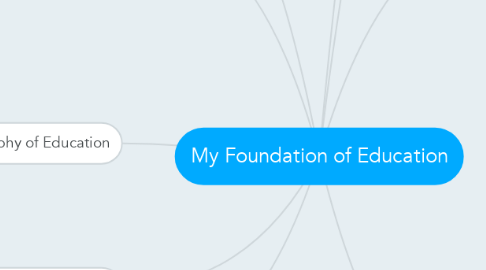
1. Philosophy of Education
1.1. Pragmatism
1.1.1. Realism
1.1.2. I love the stories of Aristotle and how he actually was the teacher of Alexander the Great. I believe that Aristotle added to his teachers philosophy of idealism. Plato believed you had to take ideas and separate them from the material world. For instance, ideas were more important than education through experimentation. Aristotle believed that matter had to be involved.
1.1.2.1. Generic Notions of realism point to the fact that Aristotle believed that only through the material world was it possible for an individual to clarify or develop ideas and this I also agree upon.
1.1.2.1.1. Aristotle was born 384 A.D. and was a student of Plato's, and died in 322 A.D.
1.1.3. Pragmatism is generally viewed as an American philosophy that developed in the latter part of the nineteenth century. Comes from the Greek word pragma which means work.
1.1.3.1. John Dewey Generic Notions: were influenced on the theory of evolution and a believe in progress. He believed we could attain a better society through education
1.1.3.1.1. Goal of Education: GROWTH
2. Schools as Organizations
3. Curriculum and Pedagogy
4. Equality of Opportunity
5. Educational Inequality
6. Politics of Education
6.1. I definitely have more of a liberal view on education.
6.2. I believe that there should be equal opportunities for poor as well as rich.
6.3. I do believe that there is potential for abuse to the education system when it is left up to political law. I believe that education professionals should be able to be given the opportunity to improve upon laws much like ANAR.
7. History of U.S. Education
7.1. 1779 Bill for a More General Diffusion of Knowledge, Thomas Jefferson.
7.1.1. Colonial Era
7.2. 1821 Troy Female Seminary in New York is founded by, Emma Willard.
7.2.1. Education for Women and African-Americans
7.3. 1863 During the Civil War , President Lincoln issued the Emancipation Proclamation, announcing the end of slavery in all states in rebellion against the Union.
7.3.1. Education for Women and African-Americans
7.4. 1954 In Brown vs. The Topeka Board of Education, the U.S. Supreme Court rules the separate but equal schools for black and white children unconstitutional. The case consisted of separate cases in four states, Briggs vs. Elliot ( South Carolina), Brown vs. Board of Education of Topeka (Kansas), Davis vs. School Board of Prince Edward County (Virginia), Belton vs. Gebhart and Bulah vs. Gebhart (Delaware),and Bolling vs. Sharpe (District of Columbia).
7.4.1. Equality of Opportunity
7.5. 1983, the National Commission on Excellence (1983), founded by President Reagan's Secretary of Education, Terrel Bell, issued its now famous report, A Nation At Risk (ANAR).
7.5.1. Educational Reaction and Reform
8. Sociological Perspectives
8.1. Functional Theory
8.1.1. When it comes to my theoretical perspective I think that the functional theory fits my theoretical perspective in relation to school and society. I too believe that we as society must function as a well oiled machine. I believe that education should contain moral values. I believe that in society our youth learns much of their morals from school or things they experience in society.
8.1.2. I know that the relationship between school and society is very important in the development of our youth. It can have both positive and negative effects also. For instance, it teaches students social unity and how to work together in society.
8.1.3. On the other hand it is hard for there to be a functional theory that is standard for everyone with the diversity of race and culture we have in the U.S. For instance, the morals being taught might not fit the social life of another
8.1.4. For example, I think it is great that school teaches people in society to work together.
8.1.5. Employment is one way that school affects society. It is much easier for a person with a high education to get the job he or she desires.
8.1.6. Teacher behavior plays an important part in education and society. When a teacher praises the students more, students actually learn more and feel better about themselves. I know of many instances where students gave up because the teacher made them feel like being in school was a waste of their time because they would never amount to anything.
8.1.7. Education and inequality is an important issue in the U.S. We seem to have a tier of classes and the people on top are much fewer than the people on the bottom. In the text book it mentions it looking like a pyramid or triangle with few rich people at the top. Can education make for a more open society.
